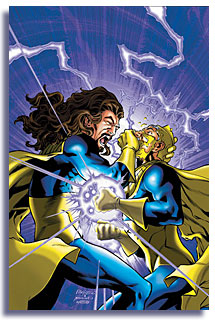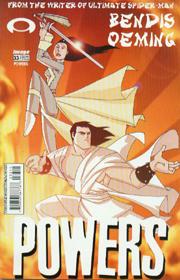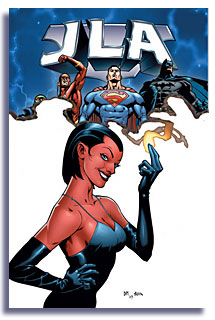JLA #84
writer: Joe Kelly
artists: Doug Mahnke and Tom Nguyen
Whether you liked the previous issue or not,
that supposed stand-alone tale really does offer an interesting
perspective for this issue. Even though Superman's greatest
fears about Lex Luthor as President are like something out
of The Dead Zone, the Man of Steel still makes the
harder moral choice.
Criminals all over the world are shutting
down mentally and emotionally, for reasons yet to be explained.
Ironically, it's at the same time that the Martian Manhunter
is learning to open up. As he comments, "I've never actually
worked at relaxing before."
Not that he relaxes very well. Even when
trying to be Mister Suburb, barbecuing for a visiting Superman,
he still makes sure that he scans his body on the molecular
level for any errant parasites and bacteria. How many of our
wives wish we would do that…
The breakdown of these criminal minds, however,
pulls J'onn out of his relaxation and his new relationship
with Scorch. Though Superman promises to have him back soon,
it clearly doesn't sit well with the former super-villain.
(And despite the cover, we'd have to guess it still is former,
or she'd be breaking down herself. Unless she's the mastermind
behind it all. Naaah.)
Every step of the way, this book is back
to its best form, especially with Mahnke and Nguyen back on
the art chores. In fine Justice League tradition, they're
re-using the cover that marked their debut in a clever way,
and you may not realize how much you'd missed them on the
book until you see their pages.
Kelly's run has had its ups and downs. Most
of the downs occurred when he focused on one member exclusively.
Where his strengths really lie are in the group dynamics,
and thus the psychology of each team member reflected from
that group. That's a long-winded way of saying that the characterization
is back at its peak this issue, and I'm looking forward to
the rest of the arc.
Rating: 
 JSA
#51
JSA
#51
writers: David S. Goyer and Geoff Johns
artists: Leonard Kirk and Keith Champagne
Why do people love this book so much? Could
it be just the opportunity to see so many favorite heroes
of yesteryear thundering toward the bad guy in a gorgeous
two-page spread? That's certainly part of it. Something about
JSA really tugs at the heart of the old-school comics
fans like myself. Not that I'm old.
But it's also been surprisingly intricate
plotting that still never gets in the way of the storytelling.
Case in point: there's a twist on the last couple of pages
that was set up at least three years ago, only revisited once
or twice before now, and unlike the "glory days" of Chris
Claremont's X-Men, it's not annoying to realize it.
Because things were still happening.
As much as this title is about legacy, it's
also about change. And Johns, often with Goyer, has never
been afraid of change. The two writers have at last given
real definition to Mordru, a villain who has been kicking
around all-powerfully for decades without having much real
motivation past grabbing for ultimate power. Please. Anybody
can do that.
But they've also been setting up interesting
things on the horizon for Captain Marvel, Dr. Fate, and a
host of other characters you thought you knew. Where other
books have used the team dynamic as an excuse for witty repartee,
that tends to take a backseat to solid characterization in
JSA, and maybe that's another reason for its strange
freshness. Few members consider themselves clever; they're
just fighting for the right.
With this issue, the books says farewell
to half of its current creative team. Penciler Kirk has been
taken off the book, a shame because he has really hit his
stride with it. Goyer leaves to focus more time on Hollywood
(including a Batman film script). Both will be missed,
but again, JSA is about legacy and change. Johns will
no doubt keep changing that legacy, and still make us love
it.
Rating: 
 Powers
#33
Powers
#33
writer: Brian Michael Bendis
artist: Michael Avon Oeming
If you left this book in disgust when it
came time for the monkey love, you're a fool. Or maybe Bendis
and Oeming were fools for thinking anybody would leave, as
the letter column a couple of issues ago implied.
You didn't just miss Bendis' shot at doing
Ultimate Moonboy (though I'm still pulling for it); it was
the beginning of no less than a complete history of the Powers
"universe." And with this issue, #33, Bendis and Oeming attempt
to answer the most basic question about superheroes: why do
they bother?
Through the three issues of this arc, one
character (possibly two) has remained consistent. But until
now, honestly, it didn't occur to me that we've met him before.
In fact, we know him quite well. It was the white stripe in
the hair that threw me.
At least Bendis makes it a bit subtle. If
not subtle, at least poetic, as the character gets the name
we know him by. What we get in exchange is the promise (next
issue) of a huge superhero team-up done as a Hong Kong Historical
Kung Fu flick: Crouching Tigra, Hidden Dragonman.
It allows Oeming to really cut loose with
some of his most emotional art, as the protagonist deals with
his pain, working through it to a sense of responsibility
toward mankind. And there's a flipside: you can almost understand
why any some might choose to be supervillains.
Though Bendis obviously has written it well,
it wouldn't work without being able to really see the inner
struggle happening. Can you say that a comic book is really
well-acted, under the smooth comicotography of Oeming?
Usually this book is gritty and terse, one
of Bendis' hallmarks. But this arc has instead been exuberant
and sweeping in scope, proving the creative team to be not
just the best at what they do, but one of the most versatile
in comics. Every month, every issue, Powers is a must-read.
Even when you're just looking at super-powered
australopithecines in heat.
Rating: 

 JSA
#51
JSA
#51





